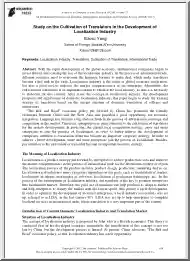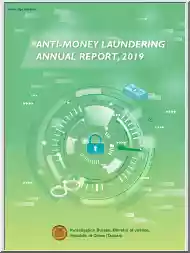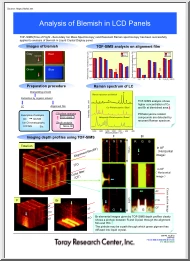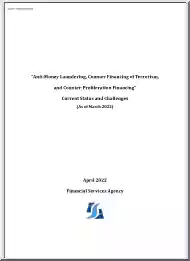Alapadatok
Év, oldalszám:2014, 6 oldal
Nyelv:angol
Letöltések száma:1
Feltöltve:2024. május 02.
Méret:1 MB
Intézmény:
-
Megjegyzés:
Csatolmány:-
Letöltés PDF-ben:Kérlek jelentkezz be!
Értékelések
Nincs még értékelés. Legyél Te az első!
Mit olvastak a többiek, ha ezzel végeztek?
Tartalmi kivonat
FOCUS Combating Money Laundering Photo Shutterstock 20 IS Chartered Accountant Combating Money Laundering Accountants to Do More C by Kwok Wui San & Fua Qiu Lin riminals are continually looking for ways to conceal the true origins of proceeds of crime. They employ various techniques to move illegal proceeds around to create distance from the illegal sources of those proceeds. Criminals hope to integrate those illegal proceeds into the financial system, allowing them to pass those proceeds off as “legitimate” monies. Moving illegal proceeds around to mask their true origins (or money laundering) requires criminals to use the services of others, in particular financial institutions. Understandably, a significant amount of focus had been (and will continue to be) on regulating and strengthening preventative measures in the financial services sector. In recent times though, there have been increased calls internationally for professionals such as accountants to do more
to combat money laundering. Criminal schemes and money laundering techniques are constantly evolving. Though financial institutions July 2014 21 FOCUS Combating Money Laundering s A professional accountant is required under Singapore law to lodge a report with the Suspicious Transactions Reporting Office, Commercial Affairs Department, if he knows or has reason to suspect that any property is connected to criminal conduct, and if such knowledge or suspicion arose in the course of his trade, profession, business or employment. 1 The Financial Action Task Force (FATF) is an inter-governmental body established in 1989 by the Ministers of its Member jurisdictions. The objectives of the FATF are to set standards and promote effective implementation of legal, regulatory and operational measures for combating money laundering, terrorist financing and other related threats to the integrity of the international financial system. The FATF has developed a series of Recommendations that
are recognised as the international standard for combating of money laundering and the financing of terrorism and proliferation of weapons of mass destruction. 22 IS Chartered Accountant with international standards as recommended by FATF. The public consultation of the proposed Guide, titled “Requirements of Anti-Money Laundering and Countering the Financing of Terrorism – A Guide for Professional Accountants in Singapore”, is now concluded and ISCA will be issuing it in its final form soon. Level up or risk being held liable for assisting in a crime Services provided by professional accountants can be highly sought after as accountants possess the necessary expertise or are able to perform certain activities which are needed by launderers to create successful criminal schemes. For example: + Criminals exploiting accountants to create corporate vehicles, trusts and other complex legal arrangements which they need to facilitate money laundering; + Criminals exploiting
accountants as reputable “front men” to carry out financial transactions on their behalf, such as getting accountants to establish and act as trustees of bank accounts, and assisting the criminals in making funds transfers and issuing and cashing cheques; + Criminals wanting to mask their identities and engage unsuspecting accountants as nominee directors and nominee shareholders of companies involved in moneylaundering schemes. A professional accountant faces the risk of being held liable for assisting in a crime, even though he had done so unknowingly. Under Singapore’s Photo Shutterstock remain the core and traditional avenue for laundering illegal proceeds, in light of increased sophistication in anti-money laundering measures implemented by the financial services sector, criminals are also seeking alternative channels and increasing the use of professionals such as accountants as part of their criminal activities. To that end, the Financial Action Task Force (FATF)1 has
issued a number of recommended antimoney laundering measures which accountants should have in place. These measures include customer due diligence and record-keeping requirements if an accountant provides certain designated higher risk services to clients, for example, when they assist in the creation, operation and management of companies or other legal entities. As one of the 36 member jurisdictions of the FATF, Singapore is committed to implement all the FATF recommendations. In this regard, ISCA will be issuing a new enhanced guide for all professional accountants (proposed Guide) that is consistent anti-money laundering laws, the prosecution need not prove that a person had actual knowledge that the proceeds are from illegal sources. Instead, a person can be held liable based on evidence showing that he had “reasonable grounds to believe” that proceeds are from illegal sources. A defence that the accountant either did not know or had no reasonable grounds to believe, is to
demonstrate that he had in place and had followed adequate anti-money laundering measures consistent with good industry practices. As professionals, defending purely on grounds of ignorance is risky, particularly when any reasonable person would likely have regarded the particular facts and circumstances to be suspicious. Without having and taking appropriate measures expected of a reasonable professional accountant, the prosecution could make a case that the accountant is doing business on the basis of deliberately “shutting his mind to the obvious” (such as not having reasonable measures on identification of red flags so that appropriate steps would have been taken to establish the nature of the source of funds). To illustrate the point, in the appeal case of PP vs Jeanette Ang (2011), the defendant lost her appeal against conviction of a moneylaundering crime and her nine-month jail sentence. The defendant had collected approximately $2 million from two Singaporean account
holders and remitted the funds to a stranger in Indonesia. It was subsequently discovered that the funds were criminal proceeds. The Singaporeans were money mules who received stolen funds related to a bank fraud. The defendant had acted upon the instructions of the stranger and assisted him to transfer the criminal proceeds out of Singapore. The judge ruled that given the suspicious circumstances in which the monies were handled, it would have been abundantly clear to the defendant, as well as to any reasonable observer, that the monies were tainted by some predicate improper criminal conduct from which they had been derived. Anti-money laundering standards expected of professional accountants are changing internationally and are influencing change in Singapore. Professional accountants will need to evaluate the adequacy of their antimoney laundering measures against the proposed Guide by ISCA. Overall, July 2014 23 FOCUS Combating Money Laundering there is an expectation for
accountants to level up, particularly those who are providing services designated as higher risk in the proposed Guide and which are in line with the FATF recommendations. Otherwise, the accountant could face a higher risk of being held liable for assisting in a money-laundering crime, even though he had done so unknowingly. Whistleblowing against client, including suspicion of predicate tax offences A professional accountant is required under Singapore law to lodge a report with the Suspicious Transactions Reporting Office, Commercial Affairs Department (CAD), if he knows or has reason to suspect that any property is connected to criminal conduct, and if such knowledge or suspicion arose in the course of his trade, profession, business or employment. Failure to whistleblow is a criminal offence. Not reporting also opens the accountant to the risk of being held for abetting the crime. The statutory obligation to report suspicious transactions to the authorities overrides any duty of
confidentiality to a client. With effect from 1 July 2013, the offences of tax evasion and serious fraudulent tax evasion under the Income Tax Act, and the offences of tax evasion and improperly obtaining refunds under the Goods and Services Tax Act, have been designated as money-laundering predicate offences. This means that if the professional accountant knows, or has reason to suspect, that a client is wilfully evading income tax or fraudulently claiming GST refunds, he is required by law to whistleblow to the authorities. s 24 IS Chartered Accountant Photo Shutterstock Statutory immunity is granted from any legal action, criminal or civil, for breach of confidentiality arising from having reported suspicious transactions to the authorities as long as the report is made in good faith, and even if no criminal activities have been found upon subsequent investigation. Furthermore, whistleblowing is also required for foreign serious tax crimes. This means that if the professional
accountant knows or has reason to suspect that a foreign tax evaded is similar to a tax imposed in Singapore, he is required by law to whistleblow to the authorities as well. The proposed Guide to be issued by ISCA contains guidance to professional accountants who provide tax services. Such professional accountants, or tax practitioners, should consider these as soon as possible. Understandably, professional accountants fear the consequences of reprisal for whistleblowing – for example, the fear of potential litigation charges from the client, or even retaliatory acts of violence from criminals. Statutory immunity is granted from any legal action, criminal or civil, for breach of confidentiality arising of any information or matter which has been obtained by the authorities, safe required by the court or law. Where accountants know or suspect that investigations by the authorities are underway, the accountant should exercise caution not to disclose related information to the
alleged perpetrator (or any other parties) so as to avoid tipping (him) off. It is an offence under the Singapore law if doing so is likely to prejudice an investigation or impending investigation. In practice, there may be circumstances which can be challenging. In such cases, the accountant should seek legal advice and consider checking with the relevant authorities. Complacency is your worst enemy from having reported suspicious transactions to the authorities as long as the report is made in good faith, and even if no criminal activities have been found upon subsequent investigation. Furthermore, the professional accountants can take comfort that whistleblowers’ identities are kept confidential. Our anti-money laundering laws prohibit the disclosure New Guidance for Professional Accountants Currently, guidance for auditors on anti-money laundering legislations and measures are contained in the Statement of Auditing Practice (SAP) 1 Guidance to Auditors on Money Laundering
and Terrorism Financing issued by ISCA. The expectations on the professional accountants’ role in combating money laundering, and the anti-money laundering measures which professional accountants should adopt, are changing. There are greater calls internationally for all professional accountants, and not just auditors, to play their part in combating money-laundering crimes by adopting appropriate anti-money laundering measures that are at least to the international standards recommended by the FATF. In response, ISCA has developed and is proposing for adoption a more comprehensive guide to all professional accountants. This proposed guide, titled “Requirements of Anti-Money Laundering and Countering the Financing of Terrorism – A Guide for Professional Accountants in Singapore”, is aligned to the FATF recommendations and was issued for public consultation in May 2014. This is an important project by ISCA. It demonstrates the commitment of the Singapore accountancy profession
to continually strengthen industry guidance to meet or exceed international standards on antimoney laundering practices. It also demonstrates our profession’s commitment to do our part in helping Singapore meet its member-country obligation to implement all FATF recommendations. The proposed guide, among others, will require accounting firms which carry on certain businesses (for example, company formation services) to adopt an enhanced set of client due diligence and recordkeeping procedures. Accounting firms will also need to re-visit their current anti-money laundering measures to ensure that they meet the requirements in the enhanced guidance. The public consultation on the proposed guide concluded on 16 June 2014. ISCA would like to thank those who provided their feedback. The proposed guide may be modified in light of comments received before being issued in its final form. A professional accountant need not be a criminal participant in a client’s illegal scheme to be liable
for charges. As explained earlier, if the professional accountant is unable to establish a reasonable defence, he is still at risk of being held liable for assisting a moneylaundering crime. Accountants need to be vigilant at all times and guard against being exploited by criminals by implementing adequate anti-money laundering measures. The professional accountant shall have regard to the proposed Guide to be issued by ISCA, and as such, engage in good practices to know your clients; ensure ongoing monitoring, guidance and processes to identify red flags, promote training and uphold compliance and audit. Complacency is your worst enemy. Resting on your laurels and not being careful give criminals the opportunity to exploit and use you to carry out their illegal activities. The consequences can be severe, and the impact on your reputation potentially irreparable. You only need to be caught out once. ISCA Kwok Wui San is Partner, PricewaterhouseCoopers LLP, and Fua Qiu Lin is Manager,
Technical Standards Development and Advisory Department, ISCA. July 2014 25
to combat money laundering. Criminal schemes and money laundering techniques are constantly evolving. Though financial institutions July 2014 21 FOCUS Combating Money Laundering s A professional accountant is required under Singapore law to lodge a report with the Suspicious Transactions Reporting Office, Commercial Affairs Department, if he knows or has reason to suspect that any property is connected to criminal conduct, and if such knowledge or suspicion arose in the course of his trade, profession, business or employment. 1 The Financial Action Task Force (FATF) is an inter-governmental body established in 1989 by the Ministers of its Member jurisdictions. The objectives of the FATF are to set standards and promote effective implementation of legal, regulatory and operational measures for combating money laundering, terrorist financing and other related threats to the integrity of the international financial system. The FATF has developed a series of Recommendations that
are recognised as the international standard for combating of money laundering and the financing of terrorism and proliferation of weapons of mass destruction. 22 IS Chartered Accountant with international standards as recommended by FATF. The public consultation of the proposed Guide, titled “Requirements of Anti-Money Laundering and Countering the Financing of Terrorism – A Guide for Professional Accountants in Singapore”, is now concluded and ISCA will be issuing it in its final form soon. Level up or risk being held liable for assisting in a crime Services provided by professional accountants can be highly sought after as accountants possess the necessary expertise or are able to perform certain activities which are needed by launderers to create successful criminal schemes. For example: + Criminals exploiting accountants to create corporate vehicles, trusts and other complex legal arrangements which they need to facilitate money laundering; + Criminals exploiting
accountants as reputable “front men” to carry out financial transactions on their behalf, such as getting accountants to establish and act as trustees of bank accounts, and assisting the criminals in making funds transfers and issuing and cashing cheques; + Criminals wanting to mask their identities and engage unsuspecting accountants as nominee directors and nominee shareholders of companies involved in moneylaundering schemes. A professional accountant faces the risk of being held liable for assisting in a crime, even though he had done so unknowingly. Under Singapore’s Photo Shutterstock remain the core and traditional avenue for laundering illegal proceeds, in light of increased sophistication in anti-money laundering measures implemented by the financial services sector, criminals are also seeking alternative channels and increasing the use of professionals such as accountants as part of their criminal activities. To that end, the Financial Action Task Force (FATF)1 has
issued a number of recommended antimoney laundering measures which accountants should have in place. These measures include customer due diligence and record-keeping requirements if an accountant provides certain designated higher risk services to clients, for example, when they assist in the creation, operation and management of companies or other legal entities. As one of the 36 member jurisdictions of the FATF, Singapore is committed to implement all the FATF recommendations. In this regard, ISCA will be issuing a new enhanced guide for all professional accountants (proposed Guide) that is consistent anti-money laundering laws, the prosecution need not prove that a person had actual knowledge that the proceeds are from illegal sources. Instead, a person can be held liable based on evidence showing that he had “reasonable grounds to believe” that proceeds are from illegal sources. A defence that the accountant either did not know or had no reasonable grounds to believe, is to
demonstrate that he had in place and had followed adequate anti-money laundering measures consistent with good industry practices. As professionals, defending purely on grounds of ignorance is risky, particularly when any reasonable person would likely have regarded the particular facts and circumstances to be suspicious. Without having and taking appropriate measures expected of a reasonable professional accountant, the prosecution could make a case that the accountant is doing business on the basis of deliberately “shutting his mind to the obvious” (such as not having reasonable measures on identification of red flags so that appropriate steps would have been taken to establish the nature of the source of funds). To illustrate the point, in the appeal case of PP vs Jeanette Ang (2011), the defendant lost her appeal against conviction of a moneylaundering crime and her nine-month jail sentence. The defendant had collected approximately $2 million from two Singaporean account
holders and remitted the funds to a stranger in Indonesia. It was subsequently discovered that the funds were criminal proceeds. The Singaporeans were money mules who received stolen funds related to a bank fraud. The defendant had acted upon the instructions of the stranger and assisted him to transfer the criminal proceeds out of Singapore. The judge ruled that given the suspicious circumstances in which the monies were handled, it would have been abundantly clear to the defendant, as well as to any reasonable observer, that the monies were tainted by some predicate improper criminal conduct from which they had been derived. Anti-money laundering standards expected of professional accountants are changing internationally and are influencing change in Singapore. Professional accountants will need to evaluate the adequacy of their antimoney laundering measures against the proposed Guide by ISCA. Overall, July 2014 23 FOCUS Combating Money Laundering there is an expectation for
accountants to level up, particularly those who are providing services designated as higher risk in the proposed Guide and which are in line with the FATF recommendations. Otherwise, the accountant could face a higher risk of being held liable for assisting in a money-laundering crime, even though he had done so unknowingly. Whistleblowing against client, including suspicion of predicate tax offences A professional accountant is required under Singapore law to lodge a report with the Suspicious Transactions Reporting Office, Commercial Affairs Department (CAD), if he knows or has reason to suspect that any property is connected to criminal conduct, and if such knowledge or suspicion arose in the course of his trade, profession, business or employment. Failure to whistleblow is a criminal offence. Not reporting also opens the accountant to the risk of being held for abetting the crime. The statutory obligation to report suspicious transactions to the authorities overrides any duty of
confidentiality to a client. With effect from 1 July 2013, the offences of tax evasion and serious fraudulent tax evasion under the Income Tax Act, and the offences of tax evasion and improperly obtaining refunds under the Goods and Services Tax Act, have been designated as money-laundering predicate offences. This means that if the professional accountant knows, or has reason to suspect, that a client is wilfully evading income tax or fraudulently claiming GST refunds, he is required by law to whistleblow to the authorities. s 24 IS Chartered Accountant Photo Shutterstock Statutory immunity is granted from any legal action, criminal or civil, for breach of confidentiality arising from having reported suspicious transactions to the authorities as long as the report is made in good faith, and even if no criminal activities have been found upon subsequent investigation. Furthermore, whistleblowing is also required for foreign serious tax crimes. This means that if the professional
accountant knows or has reason to suspect that a foreign tax evaded is similar to a tax imposed in Singapore, he is required by law to whistleblow to the authorities as well. The proposed Guide to be issued by ISCA contains guidance to professional accountants who provide tax services. Such professional accountants, or tax practitioners, should consider these as soon as possible. Understandably, professional accountants fear the consequences of reprisal for whistleblowing – for example, the fear of potential litigation charges from the client, or even retaliatory acts of violence from criminals. Statutory immunity is granted from any legal action, criminal or civil, for breach of confidentiality arising of any information or matter which has been obtained by the authorities, safe required by the court or law. Where accountants know or suspect that investigations by the authorities are underway, the accountant should exercise caution not to disclose related information to the
alleged perpetrator (or any other parties) so as to avoid tipping (him) off. It is an offence under the Singapore law if doing so is likely to prejudice an investigation or impending investigation. In practice, there may be circumstances which can be challenging. In such cases, the accountant should seek legal advice and consider checking with the relevant authorities. Complacency is your worst enemy from having reported suspicious transactions to the authorities as long as the report is made in good faith, and even if no criminal activities have been found upon subsequent investigation. Furthermore, the professional accountants can take comfort that whistleblowers’ identities are kept confidential. Our anti-money laundering laws prohibit the disclosure New Guidance for Professional Accountants Currently, guidance for auditors on anti-money laundering legislations and measures are contained in the Statement of Auditing Practice (SAP) 1 Guidance to Auditors on Money Laundering
and Terrorism Financing issued by ISCA. The expectations on the professional accountants’ role in combating money laundering, and the anti-money laundering measures which professional accountants should adopt, are changing. There are greater calls internationally for all professional accountants, and not just auditors, to play their part in combating money-laundering crimes by adopting appropriate anti-money laundering measures that are at least to the international standards recommended by the FATF. In response, ISCA has developed and is proposing for adoption a more comprehensive guide to all professional accountants. This proposed guide, titled “Requirements of Anti-Money Laundering and Countering the Financing of Terrorism – A Guide for Professional Accountants in Singapore”, is aligned to the FATF recommendations and was issued for public consultation in May 2014. This is an important project by ISCA. It demonstrates the commitment of the Singapore accountancy profession
to continually strengthen industry guidance to meet or exceed international standards on antimoney laundering practices. It also demonstrates our profession’s commitment to do our part in helping Singapore meet its member-country obligation to implement all FATF recommendations. The proposed guide, among others, will require accounting firms which carry on certain businesses (for example, company formation services) to adopt an enhanced set of client due diligence and recordkeeping procedures. Accounting firms will also need to re-visit their current anti-money laundering measures to ensure that they meet the requirements in the enhanced guidance. The public consultation on the proposed guide concluded on 16 June 2014. ISCA would like to thank those who provided their feedback. The proposed guide may be modified in light of comments received before being issued in its final form. A professional accountant need not be a criminal participant in a client’s illegal scheme to be liable
for charges. As explained earlier, if the professional accountant is unable to establish a reasonable defence, he is still at risk of being held liable for assisting a moneylaundering crime. Accountants need to be vigilant at all times and guard against being exploited by criminals by implementing adequate anti-money laundering measures. The professional accountant shall have regard to the proposed Guide to be issued by ISCA, and as such, engage in good practices to know your clients; ensure ongoing monitoring, guidance and processes to identify red flags, promote training and uphold compliance and audit. Complacency is your worst enemy. Resting on your laurels and not being careful give criminals the opportunity to exploit and use you to carry out their illegal activities. The consequences can be severe, and the impact on your reputation potentially irreparable. You only need to be caught out once. ISCA Kwok Wui San is Partner, PricewaterhouseCoopers LLP, and Fua Qiu Lin is Manager,
Technical Standards Development and Advisory Department, ISCA. July 2014 25





